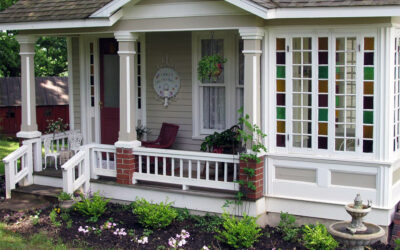
Everybody understands the business model behind flipping houses, long-term rental properties, and short-term vacation rentals. For that matter, most of us have rented a home or two ourselves at some point in our lives.
But what about other niches in real estate investing?
They say “the riches are in the niches.” If you want to skip the crowds and competition, consider some of these niche real estate investing tactics for higher returns and fewer headaches.
1. Corporate Rentals
We periodically get together with Al Williamson to break down tips for vacation rentals and Airbnb. But his favorite strategy is actually medium-term corporate rentals, in the 2-6 month range.
You furnish the property, but instead of renting it nightly on Airbnb, you market it to business travelers. People like travel nurses, who need furnished housing for a few months at a time.
The employer typically pays the rent, so you have virtually no risk of rent default. And the renter treats the property well, because they don’t want to get fired over a damage bill.
Employers pay above-market rents for furnished units leased for just a few months at a time. That alone boosts your returns and cash flow.
Best of all, you don’t even need to own the property. You can sign a long-term lease agreement with a landlord as the renter, furnish the unit, then sublease it to a corporate renter. That means you don’t have to make a down payment, and don’t have to pay for repairs or maintenance either.
Known as rental arbitrage, check out our webinar with Al Williamson where he explains the business model in detail.
2. Flip Rentals to Hedge Funds
John Riedl, founder of EasyCash Offer Florida, has a unique spin on flipping houses. “My real estate career has evolved over the years into a systematic online method, purchasing residential single-family homes and quickly reselling them online via a real estate hedge fund.
“I buy turnkey properties in cash — there is no real estate leverage involved. They are purchased with a renter and professional property manager in place, and transferred via a reputable title business, which provides me with title insurance and peace of mind. Each investment property costs less than $100,000: this is comparable to 1970s prices. They generate 9% net yield each year (cap rate), so even if I do not resell them, they generate a respectable rental cash flow.
“I can easily leverage them if I like. In fact, certain institutions will bundle them ten at a time. If I leverage them, the terms will be 80 percent loans with an interest rate of less than 5% fixed for 30 years. Cash-on-cash returns on average exceed 14% per year when leveraged. When depreciation, appreciation, principal paydown, and other factors are included, the return on investment averages 40%+ per year.
“The best part is that I don’t have to wait because I have a real estate hedge fund that purchases them directly online and posts them for acquisition by individuals seeking financing. Buyers who take out rental property loans pay a premium for properties at 8%+ cap rates). The entire procedure is completed online, and the property is resold for a higher price in less than three months through a title business. The capital gains and income yield generate cash returns of 40%+ each year.
“It is the only business concept I am aware of for earning money online in real estate in a hands-off, hassle-free manner (and with low downside risk).
“The critical point is that you buy properties at a discount by making cash offers. Then the real estate hedge fund finds another buyer who gets a rental property loan and pays more than you did, because they earn higher cash-on-cash returns due to the financing.
“It’s all done over the phone and email, and you wire the title company $100,000 as described above. A few weeks later, you receive an email from the real estate hedge fund informing you that another buyer has opened escrow and is paying you $112,500. You then sign again to release the deed and receive the $112,500 back (all through DocuSign online).
“Your net profit would be less than $12,500 because you would have incurred closing charges for the purchase and sale, as well as a 1% commission and a 1% website posting fee.” That’s still less than a real estate agent’s commission, though.
“Your net would be around $8,500 or $9,000 and you can repeat this process as often as you like — which generates well over 30% annualized even if it takes them four months to resell each of your properties. This is even more profitable because you own the properties and thus receive all rental income, which generates another 9% annualized. My annual returns online through them have been around 40% and in my experience, it has never taken them more than three months.”
3. Buy Properties Through Probate
When property owners die, their kids usually don’t want their rental properties. Often they don’t want their parents’ primary residence, either.
So they sell off these properties, often hastily. In many cases, they just want the whole headache of probate behind them, and just want to close everything out as quickly as possible. That spells opportunity for savvy real estate investors.
You step in and offer to settle fast, with no muss and no fuss. Many heirs would rather take a lightning fast closing than a full-price offer at market value.
Read up on probate real estate investing here, and check out my conversation with Sharon Vornholt about her probate investing strategy. She’s been operating in this real estate niche for over three decades, teaches a course on it, and coaches students through buying properties in probate.
4. Diversified Mid-Size Properties
What if you didn’t specialize in a single niche in real estate, but instead focused on deal size?
Keith Nelson, CEO of Dual City Investments, found a property price sweet spot. “After several years of seeing every private and public real estate company flood into the multifamily niche, we quickly realized we needed to pivot. We formed a blind pool fund whose only niche was to concentrate on middle-market deals between $2-5 million dollars, no matter the asset type or area. We chose this range because we could come in under the radar of larger REITs and funds but be more aggressive than the smaller investors. Of course, we would do extensive research on different assets and markets, enough to get comfortable with the deal and have several real estate exit strategies.
“Concentrating on that middle-market price range and being flexible on the asset and area gave us a very diverse and well-rounded fund that thrived through the COVID pandemic. Our philosophy is that flexibility and agility are more valuable than specialization unless that real estate niche is so specialized that the competition is scarce, but that is rarely the case for any length of time in investment real estate. The real estate market is cyclical, and inside of that larger market cycle, the asset classes, as well as geographical areas, are independently cyclical.
“A few of the factors that can affect the niche are shifting demographics, local economies, industry entering or leaving areas, and the cost of construction. It is great to have a niche and become knowledgeable in that one area, but it is better to be knowledgeable in multiple areas and be able to move and flow with all the different cycles investment real estate contends with.”
5. Large Apartment Buildings
“My real estate niche is large apartment buildings,” explains George Beatty, founder of Problem Property Pals. “The larger a building, the more chances it has of helping an owner earn money. Earning income from many units to pay for one roof, one parking lot, and one crawl space is enough incentive. It also opens up the opportunity of multiplied cash flow from many units. Due to the high price point, investors finance these beneficial properties with a combination of commercial loans and collect money from partnerships. Real estate investment trusts (REITs) and other large organizations focus on these property types.”
The more expensive the building, the fewer the competitors who can afford it. That can drive up cap rates and returns, by keeping the purchase price low relative to the revenue.
And they’re easier to finance than many investors believe. “These vast complexes are tailor-made for easy financing and earning good money in the process,” Beatty adds. Lenders like RCN Capital and Commercial Loan Direct cover up to 83% of the purchase price.
You don’t have to buy these properties by yourself, or hassle with financing, tenants, contractors, or any of the other headaches of active real estate investing. In our Co-Investing Club, we all chip in small amounts to invest in large apartment buildings. As fractional property owners, we get all of the benefits of owning real estate without any of the headaches of being a landlord.
6. Office Real Estate
Teresha Aird, co-founder of Offices.net, makes a strong case: “Reports of the demise of the office are greatly exaggerated.
“Changing workplace demands and the rise of remote working models haven’t killed the office. Instead, they’ve transformed commonly held notions of ‘traditional’ workspace and supplanted them with a more free-flowing, flexible alternative. Offices are no longer places where people go to work and work alone. Companies looking to attract top talent are now selling the idea of an all-encompassing workplace ‘experience,’ one that marries in-office and remote schedules with networking events and collaboration that pivots between the virtual and physical worlds at the drop of a hat.
“What excites me about commercial real estate is its flexibility to deal with rapid market changes, something which has been borne out and proven since the start of the pandemic. Whether it’s offering 24-hour, 365-day secure access to your office space, or movable fit-outs and pods to accommodate varying social distancing requirements, the commercial sector’s flexibility is certainly what keeps it relevant, and the investor who moves with the times – successful.
“Yes, we’ve seen a drop in commercial tenancies over the past two years as a result of various lockdowns and public health measures. With the rapid changes and uncertainty in the market, however, there are opportunities inherent for the astute commercial stakeholder. What was once considered uncommon forms of work in our society — such as freelance, remote and hybrid positions; are now much more accepted, and even encouraged — especially by governments who want to keep economies bustling along, even when the streets and office corridors are barren.
“No small amount of bargaining power has shifted to the worker, who insists on flexible work arrangements to help facilitate a better work-life balance. In response to this pressure, many employers are offering flexibility in the positions they advertise, as well as the variability to work outside the traditional 9-5.
“The results of this radical change to traditional work have seen quite drastic changes in commercial property. More office spaces are being offered for short-term rental, as opposed to just long-term lease agreements. Coworking spaces are back in vogue, and traditionally partitioned gray spaces have rapidly morphed into trendy hybrid working hubs to accommodate a variety of workers. Commercial property investors who were quickly able to pivot, supplying what this emerging market demanded, have reaped the most benefit.”
7. Raw Land
Deni and I invest in raw land, along with her daughter Tara and her husband.
The business model is simple: reach out to owners in tax sale, and offer them a lowball sales price. We buy for low sums, often $1,000-5,000, and then sell the land for three or four times that.
Sometimes plots sit for sale for a year or longer. But as long as we don’t own plots in homeowners’ associations — with their attendant monthly fees — our only carrying costs are the extremely low property taxes.
Best of all, we don’t have to worry about tenant screening, maintenance and repairs, rent collection, anti-landlord regulation, property management fees, code violations, or any of the other headaches that landlords face.
8. Trailers on Land
Mobile homes aren’t sexy, and neither is the kind of land that most trailers sit on. But unsexy usually means higher returns.
Because investors aren’t clambering all over each other to buy pieces of land with trailers on it, you can often score excellent cash flow on these deals. The gross rent multiplier of these deals is usually quite low. “Trailers offer lower buy costs and higher income from rents,” explains Michel Cocke, CEO of 253 Houses.
In fact, Deni and I interviewed an investor named Adrian Smude who specializes in these deals. Check out the interview below, it’s a fascinating business model yielding high returns and low headaches.
9. Mobile Homes Without Land
You don’t have to buy a piece of land with a mobile home on it, or a mobile home park for that matter. Why not buy the physical mobile home instead?
We interviewed Rachel Hernandez, AKA The Mobile Home Gurl, about her strategy buying individual mobile homes, renovating them, and then renting them out. I could tell you about it — or you could hear it from the expert herself:
10. Self-Storage Facilities
Self-storage facilities straddle the line between niche real estate investing and operating a traditional local business.
As with short-term rental properties, your profit ultimately comes down to your occupancy rate and rents, compared to your average long-term expenses. But unlike residential properties, you don’t have the regulation or hassles, such as the lengthy eviction process, rent control, squatter’s rights, or worries over Fair Housing lawsuits.
You also have a much simpler physical property to maintain, without the complex plumbing and other mechanical systems required in residential homes. Again, self-storage facilities come with fewer headaches and often higher returns.
Of course, buying an entire self-storage facility by yourself might stretch your budget. And, for that matter, your time. Consider investing passively in a self-storage real estate syndication, for a fraction of the money and none of the time commitment.
11. Private Notes
No one says you have to own real estate directly in order to invest in it.
Instead, you can lend money to other real estate investors, secured by a lien against their property. You collect passive income, without needing to field 3am phone calls from tenants or repair leaky toilets.
I lent a private note to a married couple that owns a dozen or so rental properties, to use as flex funding. They pay me 10% interest only, and either of us can close out the loan with 30 days’ notice. The interest arrives in my bank account every quarter, without me having to think twice about it.
Just make sure you only lend money to experienced real estate investors you know and trust. If you have to foreclose or sue them in court to recover your money, you’ve already lost a huge sum in court costs, legal fees, and collection costs.
Alternatively, you can invest in real estate crowdfunding platforms that lend to other investors. I particularly like Groundfloor and Concreit for this, and invest my own personal money in both. Groundfloor lets you pick and choose individual loans, while Concreit lets you buy shares in a pooled fund that pays a 5.5% annual dividend, and lets you withdraw your money at any time.
Final Thoughts
From small single-family rentals to enormous office high rises, every niche in real estate has its own pros and cons. The trick isn’t to find the “perfect” real estate investing niche — it’s to find the one that best suits your goals. And that goes beyond the type of property; it includes the real estate business model.
Personally, I like to diversify into as many as possible. I own rental properties, real estate crowdfunding investments, private notes, raw land, and more. I have plans to invest in a self-storage facility in the coming months, and hope to add even more real estate niches soon.
Other investors like to pick one real estate investing niche and go deep, investing only in it. There’s nothing wrong with that strategy, as long as you’re prepared to pivot when those niche market conditions change.
Which they always do: no market is static, and the sooner you accept that the only constant is change, the better you’ll be able to adapt as the landscape shifts.♦
What’s your favorite niche in real estate investing? Why?
More Real Estate Investing Reads:
About the Author

G. Brian Davis is a real estate investor and cofounder of SparkRental who spends 10 months of the year in South America. His mission: to help 5,000 people reach financial independence with passive income from real estate. If you want to be one of them, join Brian and Deni for a free class on How to Earn 15-30% on Fractional Apartment Building Investments.
























Raw land! From vacant to valuable 😉
Haha, love it Maya!
I’ve never even heard of corporate medium-term rental before, but it sounds like a profitable niche. Super interesting to see how other people make money with real estate.
Agreed Matty!
My dream niche? Converting an abandoned hospital into a large, exciting apartment complex! It may sound horrific, but it’s a fantasy I hope becomes reality! LOL.
Haha, I love it Sara!
It never even occurred to me to invest in some of these real estate niches. Going to do a little more digging on these, try to find my own perfect investing niche
Glad to hear it Samantha!
I’m diving into work-from-home real estate and live/work/play communities. Embracing change and adapting to new norms is essential for achieving success in today’s rapidly evolving landscape.
I’m bullish on it as well Martin!
I’m a huge believer that the “riches are in the niches” as they say. The deeper you niche down, the less competition and the better the profits to be had.
Agreed Jasmine!
Good reminder that there’s a niche for everyone in the real estate market.
Agreed Gwen!
Great points here Brian, I’ve been an investor since 2005 when I bought my first 4 family, then a duplex. Now, I just have single family homes and I like this niche because the renter is usually a longer-term renter. In my experience, they treat the property like its theirs and seem to take pride in it more than that of a multi-family.. Not to say I wouldn’t consider a multi in the future again though.
Long-term renters are great, if you can find them. Turnovers are where all the costs and headaches come from for landlords.
I prefer diversified mid-size properties because of the flexibility and agility they offer in different market conditions.
Thanks for the feedback Kirk!
Some fresh ideas here. Thanks for sharing!
Glad it was helpful Jon!